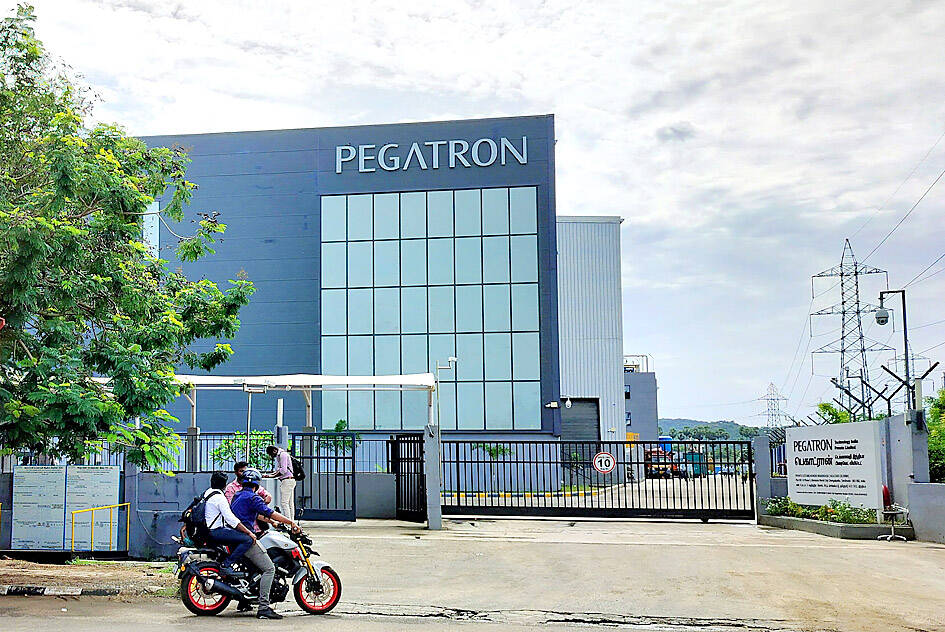A fire that broke out on Sunday at a Pegatron Corp (和碩) plant in Chennai, the capital of India’s southern state of Tamil Nadu, has had little impact on operations, the company said on Monday.
The iPhone assembler said in a statement that a small power panelboard at the factory caught fire on Sunday night, but the situation was quickly brought under control.
The incident did not result in casualties or damage to the plant, Pegatron said.

Photo: Reuters
The plant is in Mahindra World City, an industrial park in Chennai.
It produces the iPhone 14 and iPhone 14 Pro, as well as the newest iPhone 15 and iPhone Pro models, Chennai-based TV channel Thanthi reported.
The plant halted production for a second day yesterday, but the fire broke out on a holiday, so the facility was not operational at the time, Reuters reported.
The Chennai facility has a production capacity of about 26,000 iPhones a day. It has been assembling about 8,000 to 12,000 iPhones per day over the past few months, Reuters reported, citing an industry source.
Pegatron accounts for about 10 percent of India’s iPhone production, research firm Counterpoint said.
The company began assembling iPhones in India in September last year and has been in talks to set up a second production site near its Chennai facility, Reuters reported.
Apple has made significant investments in India since 2017, mainly iPhone assembly via Taiwanese contract manufacturers, in line with the Indian government’s promotion of local manufacturing.
Taiwan’s Hon Hai Precision Industry Co (鴻海精密), also known as Foxconn Technology Group (富士康科技集團), and Wistron Corp (緯創) are also producing iPhones for Apple in India.

Semiconductor business between Taiwan and the US is a “win-win” model for both sides given the high level of complementarity, the government said yesterday responding to tariff threats from US President Donald Trump. Home to the world’s largest contract chipmaker, Taiwan Semiconductor Manufacturing Co (TSMC, 台積電), Taiwan is a key link in the global technology supply chain for companies such as Apple Inc and Nvidia Corp. Trump said on Monday he plans to impose tariffs on imported chips, pharmaceuticals and steel in an effort to get the producers to make them in the US. “Taiwan and the US semiconductor and other technology industries

SMALL AND EFFICIENT: The Chinese AI app’s initial success has spurred worries in the US that its tech giants’ massive AI spending needs re-evaluation, a market strategist said Chinese artificial intelligence (AI) start-up DeepSeek’s (深度求索) eponymous AI assistant rocketed to the top of Apple Inc’s iPhone download charts, stirring doubts in Silicon Valley about the strength of the US’ technological dominance. The app’s underlying AI model is widely seen as competitive with OpenAI and Meta Platforms Inc’s latest. Its claim that it cost much less to train and develop triggered share moves across Asia’s supply chain. Chinese tech firms linked to DeepSeek, such as Iflytek Co (科大訊飛), surged yesterday, while chipmaking tool makers like Advantest Corp slumped on the potential threat to demand for Nvidia Corp’s AI accelerators. US stock

The US Federal Reserve is expected to announce a pause in rate cuts on Wednesday, as policymakers look to continue tackling inflation under close and vocal scrutiny from US President Donald Trump. The Fed cut its key lending rate by a full percentage point in the final four months of last year and indicated it would move more cautiously going forward amid an uptick in inflation away from its long-term target of 2 percent. “I think they will do nothing, and I think they should do nothing,” Federal Reserve Bank of St Louis former president Jim Bullard said. “I think the

SUBSIDIES: The nominee for commerce secretary indicated the Trump administration wants to put its stamp on the plan, but not unravel it entirely US President Donald Trump’s pick to lead the agency in charge of a US$52 billion semiconductor subsidy program declined to give it unqualified support, raising questions about the disbursement of funds to companies like Intel Corp and Taiwan Semiconductor Manufacturing Co (台積電). “I can’t say that I can honor something I haven’t read,” Howard Lutnick, Trump’s nominee for commerce secretary, said of the binding CHIPS and Science Act awards in a confirmation hearing on Wednesday. “To the extent monies have been disbursed, I would commit to rigorously enforcing documents that have been signed by those companies to make sure we get